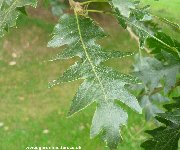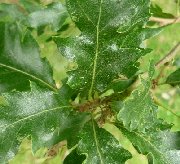Categories
Calendars
Guides
Reviews
Archive
Gallery
Articles
Ask Our Gardening Expert
Turkey Oak (quercus cerris)
Turkey Oak (quercus
cerris) The tree is fast growing, reaching a height of 38m (125ft) when mature. It
is often used as the stock (lower part) when grafting on other slower growing oak trees. The
wood is of poor quality, principally because the tree grows so fast. But it does look
impressive in parks and arboretum. It will grow well on chalky soils.
The acorn is the most distinguishing feature when identifying
this tree. The cup is frilled and very distinctive. They are produced over a two
year period turning from green to a light brown.
RIPENED ACORN HERE
Tree Name
Other Distinctive Features
Quercus castaneifolia
The leaves of quercus cerris are significantly more lobed.
Quercus cerris is also a far more common oak tree.
Quercus x hispanica
Although the leaves of the two tree are similar, those of
quercus cerris are more pointed at the ends of the lobes.
Quercus trojana
The acorn cup of quercus cerris is far more 'frilled' and
the leaves are more lobed.
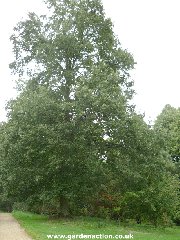
Pyrenean Oak, click to enlarge
Do not confuse this tree with the American Turkey Oak which is often called just the Turkey
Oak in North America.
First, let's get the naming of this tree correct. It is the Turkey Oak,
quercus cerris. There is also an oak which should be called the American Turkey Oak (quercus
laevis) but is often shortened, incorrectly, in North America to the Turkey Oak. The two
trees have quite different characteristics. This page details how to identify the true
Turkey Oak (quercus cerris).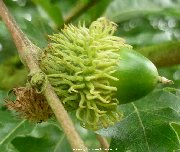
Other oaks which have a similar distinctive cup are listed below with other means
mentioned for identifying the Turkey Oak. See the picture of the Turkey Oak leaf below
the table to confirm identification.
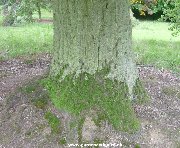 The bark is similar to many other tall growing oak trees. It is greyish with
deep lines running up and down the trunk.
The bark is similar to many other tall growing oak trees. It is greyish with
deep lines running up and down the trunk.
